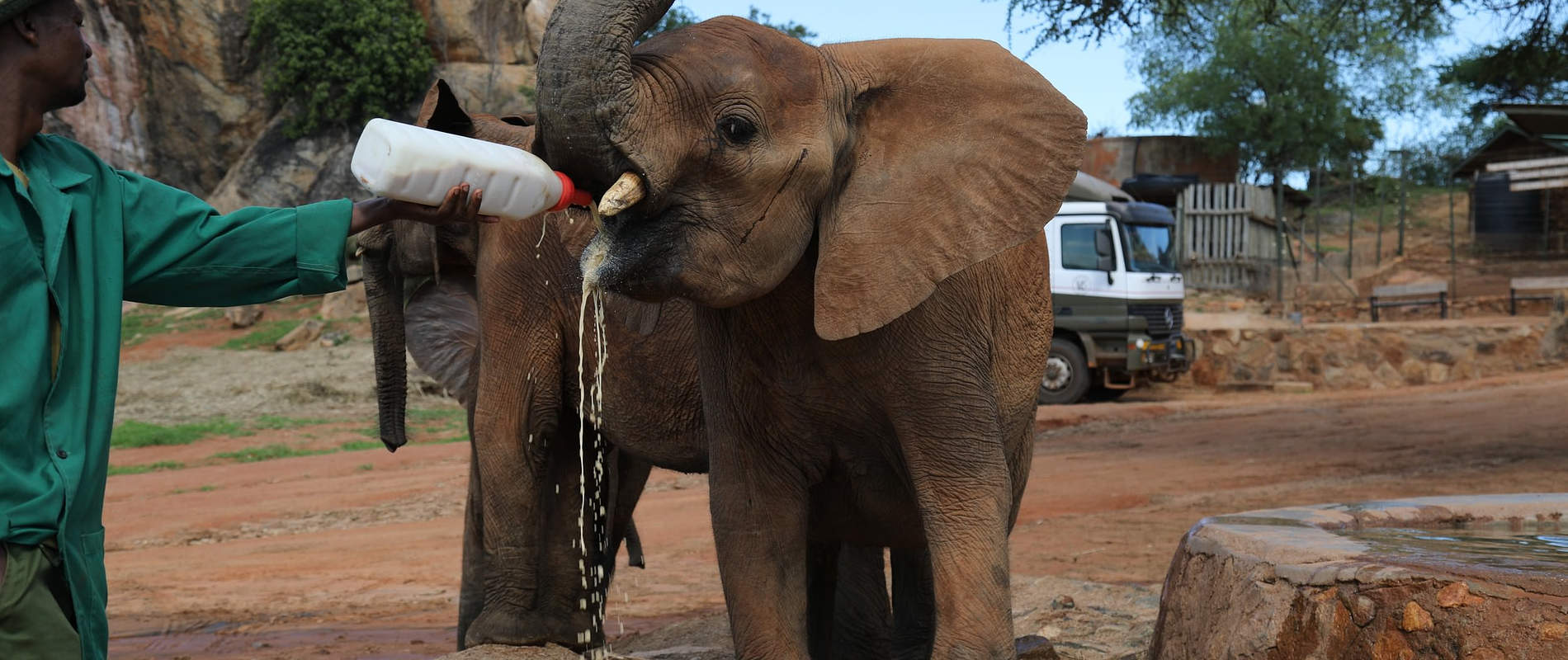On the 14th of May three of the older orphans in our Nursery embarked on their journey to Tsavo, destined for our Ithumba Reintegration Unit
On the 14th of May three of the older orphans in our Nursery embarked on their journey to Tsavo, destined for our Ithumba Reintegration Unit. The decision of when to move the older orphans onto Tsavo is predominantly based on two factors, outgrowing the Nursery, and whether or not there have been good rains in Tsavo. While Voi and the Southern area of Tsavo East have had little to no rain, thankfully the north of Tsavo East at Ithumba the rain has been better than expected. The food is plentiful and the waterholes are brimming. .
The loading of these three orphans, big bulls Kelelari and Karisa, and female Dupotto, began at 3.00am and went fairly smoothly until Karisa got close to the entrance of the custom built elephant moving truck. His two friends had gone in without a second glace but, Karisa, appeared extremely wary of those last few steps, but it did not take too much persuasion to eventually give him a convincing push quickly closing the gates behind him.




The three Keepers who were accompanying them on the trip immediately jumped on-board, and in no time they left the confines of Nairobi National Park and were on the deserted roads of Nairobi and leaving the city. Leaving so early has the advantage of no traffic, a rarity in Nairobi nowadays, ensuring too that they are travelling in the coolest time of day, making the journey easier on the babies. It is always amazing to watch how relaxed they are, feeding busily on their freshly cut greens hanging in the truck, totally trusting in their human family and their destiny! The convoy that headed down the main Nairobi Mombasa highway consisted of a vehicle for backup should there be any dramas along the way, and on this occasion a film crew following the journey of these three orphans, and their next phase in Ithumba.






Moving them to Tsavo is a key stage for the orphans, as it is from here that they will mix with wild elephants and return to a fully wild life. Like our own human children, finding independence is a personal journey and at the pace of the individual, moulded by experiences along the way.. These orphaned babies destined for Ithumba, as with all those that have made the journey before them, will remain our responsibility for as long as they feel the need. While our ex orphans in Ithumba provide a wonderful catalyst in making the transition seamless, as in Ithumba there are 60 orphans who are now living independent lives, but still choose to keep contact with their dependent friends and elephant Keepers, and help with the relocation process, understanding what needs to happen, and when individuals are ready to take that next step.




Thankfully despite rain and the road being rather precarious in places the truck got through without getting stuck in the mud, and arrived at Ithumba at 10 o’clock in the morning, ahead of schedule. In no time the doors were opened and the babies disembarked, understandably rather disorientated. The ever present milk bottles soon reassured them that some things haven’t changed and their trusted Nairobi Keepers led them to the water so that they could take a drink and cool off. The temperature at Ithumba is certainly hotter than what they have been used to. Interestingly what happened next was a bit of a surprise, the three babies immediately took off in the direction Kauro, Tusuja and Naseku were approaching from, seemingly aware of their arrival long before their human family. Soon they were engulfed by the dependent orphans who were led to feed in manageable groups, and Dupotto found herself reunited with the settling presence of old friends Kamok, Kauro, Roi, Naseku and Oltaiyoni. Because Kelelari was rescued as a much older elephant he seamlessly slipped into Ithumba life, and appeared the most comfortable of the three. Karisa on the other hand remained the most nervous, but by the end of the first day even he was showing signs of settling down. The company of the dependent orphans surrounding them communicating with them throughout, brought a level of calm to the day, and for the casual observer these three new arrivals looked very much like they had been there their whole life.






Just as the temperatures soared the whole herd ambled towards the mud bath arriving at midday ready for a cool down, and with the recent rains the mud bath was now once again full. Kelelari enjoyed his mud bath splashing the Ithumba grey clay over his body while Karisa and Dupotto remained close to both him and their beloved Nairobi Keepers for comfort.






The day proceeded comfortably and that evening they entered their night stockades by faithfully following the others. The set up at Ithumba is rather different to what they have been used to in Nairobi, but soon the group were fed their evening feed and settled down within their night stockade, surrounded by a protective electric fence to keep away predators. After feeding on the freshly cut greens in their stockade they made their way to the red earth pile, turned each day to provide them a cool and soft sleeping place for the night, and eventually each of them laid down and fell fast asleep, exhausted by the day’s events.





This trip was one of the most seamless we have ever done, which was a relief for all concerned, and Ithumba has never looked more beautiful after some really good rain.



































